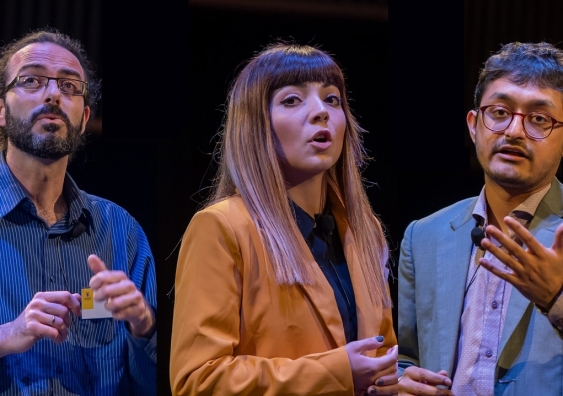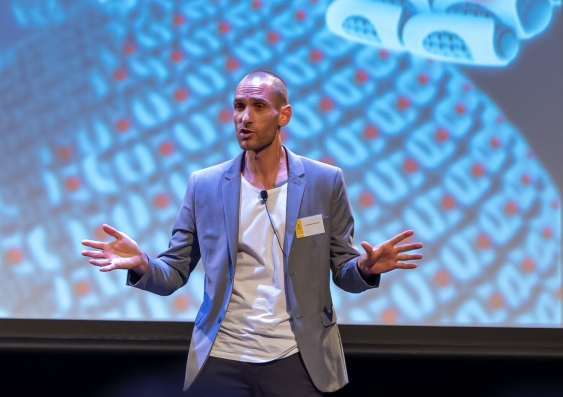3 Minute Thesis Final to showcase amazing PhD research
Livestream will allow viewers to see cutting-edge topics boiled down to just 180 seconds by UNSW research candidates.
Livestream will allow viewers to see cutting-edge topics boiled down to just 180 seconds by UNSW research candidates.

Neil Martin
+61 293850790
n.martin@unsw.edu.au
Have you ever wondered what the computers of the future will look like? Or why music can evoke memories in your brain? Or even what’s inside your tiramisu?
All those questions – and many more – will be addressed by some of UNSW Sydney’s brightest minds at the prestigious 3 Minute Thesis Final on September 17.
The 3MT event is an academic competition when PhD candidates have just 180 seconds, and a single Powerpoint slide, to explain their research and demonstrate why it is important.
This year, 22 students will battle it out in the John Niland Scientia Building for the $3,000 first prize - as research candidates consolidate their ideas and distil their discoveries down to a bite-size presentation that can be easily understood by all.
UNSW Chancellor David Gonski AC is a big supporter of the 3MT competition and said: “I find the 3 Minute Thesis final totally uplifting, amazing and inspiring.
“The innovative, imaginative and exciting thoughts of more than 20 competitors holds one’s interest until the very end. It is a must to attend or view.”
As well as the main award, there are also prizes for the runner-up ($1,500), third place ($500) and a $1,000 People’s Choice award - as determined by the audience. In addition, a selection of high school students from the UNSW ASPIRE program will award their own prize of $500 for their favourite presentation of the night.
The UNSW 3MT final will be live-streamed on the internet, allowing anyone around the world the chance to listen to research topics including dementia, solar cells, decentralised supply chains, pancreatic cancer and demographics being explained.
The overall winner will go on to represent UNSW at the Asia Pacific competition at the University of Queensland, as well as the international Universitas 21 final – a virtual event with judges watching video presentations.

Jonathan Berengut presenting his winning 3 Minute Thesis at the 2018 Final - entitled ‘Bio-Nano Robo-MoFos’
Professor Jonathan Morris, Dean of Graduate Research at UNSW, says: “3MT provides a showcase of research communication at its finest.
“Our PhD candidates work on cutting-edge research projects, tackling some of the greatest challenges facing the world today, from inequality to climate change. The 3MT competition is a tremendous way to showcase the University’s most exciting doctoral research.”
Last year’s winner was Jonathan Berengut who impressed the judges and crowd for a presentation explaining his PhD research into nanoscale robots being programmed into larger formations to potentially help health scientists achieve complex biomolecular tasks.
Although tickets for the 2019 3MT Final are already sold out, you can log on to watch the live-stream of the event at hospitality.unsw.edu.au/livestream/3mt.
UNSW 3 Minute Thesis Finalists, 2019
Riza Veloso: Music-evoked autobiographical memoriesEun Kyong Park: Beliefs about bilingualism, family literacy practices and identity: Family language policies of Korean immigrant parents in AustraliaKristen Overton: A Sociological Study of Antimicrobial use and Resistance in IndiaSimon Lloyd: Water sensitive innovations aimed at reducing pathogen contamination in ambient water bodiesElijah Frimpong Boadu: Promoting health and safety through procurement: framework for the construction industry in developing countries (case study of Ghana)Daniel Wheadon: Demographic change and optimal policy responseChristian Criado-Perez: Evidence-based management: Identifying its barriersNursafwah Tugiman: Message framing strategies in the charity sectorAnnette Spooner: Dementia: The Devil is in the DataAnkita Singh: What’s inside my Tiramisu?Utkarshaa Varshney: Solar Cells: It’s all about the toppingsNoah Jenkins: Protecting the Public When Businesses Are Their Own JudgesQi (Belle) Guo: Continuous disclosure of Chinese cross-border listed companies in AustraliaJohn Kokkinos: Reprogramming Pancreatic Cancer Cells to Surrender to Death SignalsHamish Fibbins: Exercise is medicine - but how do we get doctors to prescribe it?Sarah Alexandrou: The Road to ResistanceSusan Everingham: Time travelling seeds, revealing the impacts of climate changeGeorgina Carson: Computers of the future: Using tiny particles to solve big problemsMuhammad Ali: SMART HOME VisionMarjia Haque: Optimisation of Decentralised Supply ChainsCecile Medail: Ethnic Aspirations in Myanmar